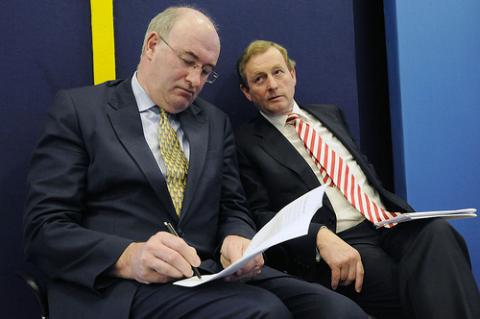More hypocrisy from Fine Gael

The claim that Fine Gael has to respect Michael Lowry’s mandate is hypocritical. By Vincent Browne.
Following the publication of the report of the Moriarty tribunal on 22 March 2011, Denis O’Brien said: “This judge [Michael Moriarty] is flawed...you have to challenge and I don’t care who it is, a judge when he’s flawed. I lost my challenges [in the High Court and the Supreme Court] against this judge because the judiciary have put a ring of steel around him because they know he was never up to the job of actually writing this report and subsequently said ‘God, we better protect this man’.”
The remark was not just a challenge to the integrity of Michael Moriarty, the chairman of the tribunal, but a challenge to the integrity of the judiciary as a whole. It was several days before any Minister responded. Enda Kenny never did so.
In his 29 March Dáil speech on the report last year, just ten days after he became Taoiseach, Enda Kenny, made no reference to the denigration of the judiciary and avoided making a single critical reference to Denis O’Brien by name. There was a clause stating: “I know that yet another report reeking of financial greed or an obsessive attachment to power and breathtaking attempts to acquire, use and access privilege, is enough now for the people of Ireland.” But no acknowledgment of whom he was talking about. A few sentences further on Kenny said: “The tribunal found seriously against deputy Michael Lowry and others who are major players in Irish business in public life.”
So what is surprising about Enda Kenny fraternising in public with the man he could not criticise even after he had denigrated one of the central institutions of our State? A man against whom findings had been made by a tribunal established by a national parliament and chaired by a judge of the High Court.
Among the central findings of that tribunal were:
* Michael Lowry “secured the winning” of the 1995 mobile phone licence for a company controlled by Denis O’Brien;
* Denis O’Brien made two payments to Michael Lowry in 1996 and 1999 totalling IR£500,000 and supported a loan of Stg£420,000 given to Michael Lowry in 1999;
* Michael Lowry disclosed substantive information to Denis O’Brien which was of “significant value and assistance to him in securing the licence”.
In that Dáil speech Kenny managed to avoid saying he accepted the findings of the tribunal, although he made a big play of the entirely vacuous gesture of referring the report to the Garda Commissioner, the Director of Public Prosecutions and the Revenue Commissioners “without issue, hesitation or equivocation”, although there had been much issue, some hesitation and a lot of equivocation throughout that speech and in his conduct since then. (Entirely vacuous, because each of these was capable of accessing the report themselves.)
On 30 March last, Phil Hogan said in the Dáil: “I accept the findings of the report.” Later on in the speeches he said: “I hold no truck for those found to have behaved as described by Mr Justice Moriarty and they should be subject, as they have been put to by the Taoiseach, of all the full rigours of all the agencies of the State.”
Phil Hogan was himself an agency of the State in his capacity as Minister for the Environment, Heritage and Local Government, and just a few days after saying, by inference, that Michael Lowry should be subject to the full rigours of all the agencies of the State, he deployed his own agency to entertain a delegation led by Michael Lowry. Thereby bestowing on Michael Lowry the favours of the State, rather than the full rigours. Ditto, incidentally, Michael Noonan and James Reilly.
When in government in the 1970s and 1980s, Fine Gael had no difficulty refusing to meet elected representatives of Sinn Féin and there was no trouble in disregarding the mandates those representatives had obtained in elections. So the claim now that Fine Gael has to respect the mandate of Michael Lowry seems thin and just part of the hypocrisy that surrounds much of this and so much else in our public life.
The core belief of Fine Gael (maybe its sole core belief) that it is untainted by impropriety, wrongdoing and corruption, unlike Fianna Fáil, is false. Fine Gael was the party most associated with perhaps the worst corruption scandal the Irish State has known: the Irish Hospitals Sweepstakes. Several of its councillors were also engaged in planning corruption.
And it was a Fine Gael-led government and a Fine Gael minister that granted by far the most valuable award the State ever bestowed: the second mobile phone licence. And it was not just a single minister that was engaged in that; the entire government was involved.
But nothing about individual corruption comes anywhere close to comparing to the construction of a deeply corrupt and unjust society and, in that enterprise, Fianna Fáil, Fine Gael, Labour, the Green Party and the late PDs can share the credit. {jathumbnailoff}
